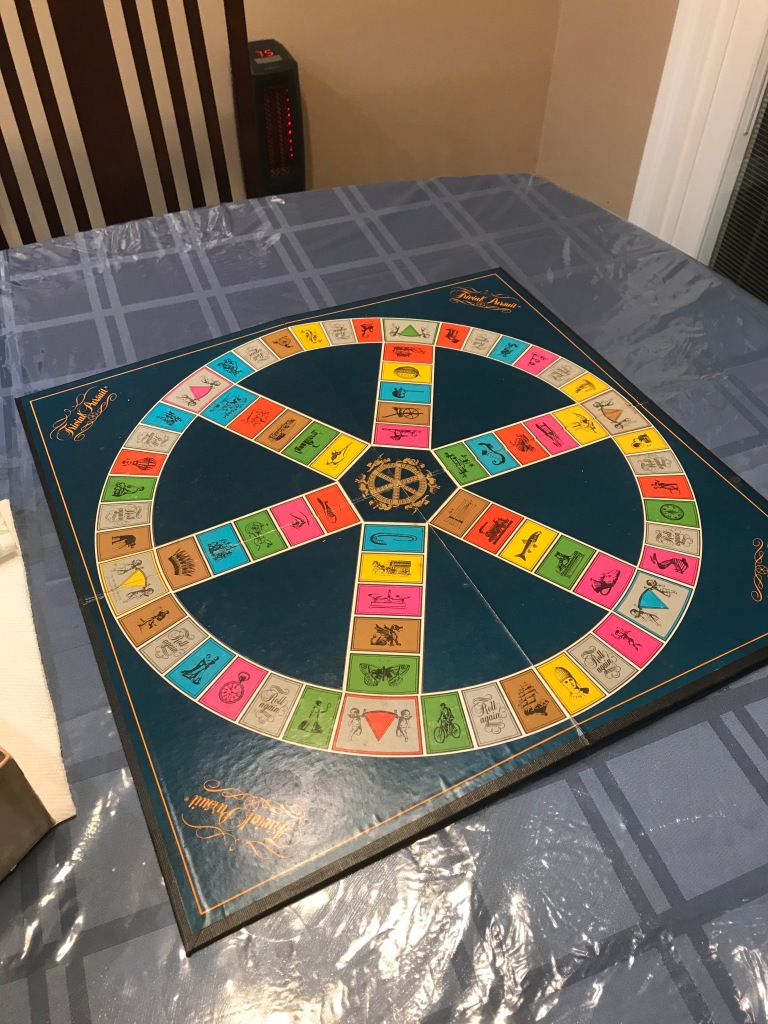After leaving Hoboken, NJ to shelter-in-place at my parents’ home on eastern Long Island, I found my grandmother’s edition of Trivial Pursuit from 1981—about ten years before I was born. So like a good social distancer stuck inside on a Friday night, I gathered my family around the kitchen table and called my boyfriend on video chat to enjoy a game.
The rules for Trivial Pursuit are fairly straightforward. Each player receives a round game piece divided into six empty spaces. Players move their piece around the game board, answering trivia questions along the way. They must correctly answer a trivia question in six categories (geography, science & nature, history, entertainment, sports & leisure, and arts & literature), which will earn them a colored wedge for their game piece. To win, players must fill up their game piece with one wedge from each category and answer a final question.

We set up the yellowing, mothball-scented board and started to play. But within a few questions, the game’s age was starting to show. Some of the particularly outdated questions included:
- What board game is banned in the Soviet Union? (Answer: “Monopoly.” This question was written ten years before the collapse of the USSR).
- What complex in New York City features 43,600 windows and 40,000 doors? (Answer: “The World Trade Center.” The question was written 20 years before 9/11).
- Which actor referred to himself as the “Errol Flynn of B Movies”? (Answer: “Ronald Reagan.” He had just started his presidency when the game was released).
In many ways, Trivial Pursuit was like a time capsule. The question cards captured a lot of “current events” from the late 1970s and early 1980s—events that we would now consider “history.” It piqued my curiosity to see which happenings from the 1970s and 1980s were deemed important enough to make it into the game of general knowledge.
But not all the questions were about the 70s and 80s. In fact, the question that disturbed me the most took place about 700 years ago: “Which disease caused the Black Death?”
It was an uncomfortable reminder of why I was sitting in my family’s kitchen that night. New York and Hoboken were in lockdown due to the coronavirus outbreak. I hadn’t been to the office in weeks. I knew friends and acquaintances who were diagnosed with COVID-19. And there was no clear timeline for a return to normalcy.
As I dropped the colored wedge into my game piece for the correct answer (“the bubonic plague”), it occurred to me that the Black Death–like every other question in the game–was an event that millions of people had lived through. But to me, hundreds of years later, it was just a question on a trivia card. At some point along the way, the Black Death had passed from one of the most traumatic events in world history to a trivia question for my amusement. And the same could be said for the other questions I answered throughout the game about the Roman Empire, World War II, the American Revolution–even that silly question about the Soviet Union.
I wonder if 10, 20 or 40 years from now, I’ll play a new version of Trivial Pursuit with a question about the coronavirus pandemic. Will it ask about the final death toll, the economic impact, the search for a cure? What will gamemakers consider important enough to be “general knowledge” about this current crisis? What will those who are living through it now think about having their pain and suffering reduced to a few words on a trivia card?
It’s hard to look that far ahead as my own life—and those lives around me—have been so disrupted. It’s hard to be separated from loved ones, to work from home indefinitely, to see friends and strangers falling ill. It’s hard to read the news or scroll through social media every day, only to wonder when will this all end?
But if the questions from Trivial Pursuit are any indication, even in times of crisis and change the world does go on. The Black Death did end. The Soviet Union did fall. The coronavirus panic that grips the world right now will gradually fade from the horrors of the present day into the annals of history (and into some future edition of Trivial Pursuit).
